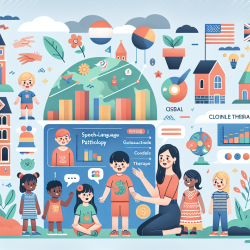Introduction
In the evolving landscape of global dynamics, the intricate relationship between the United States and China offers valuable insights for speech-language pathologists (SLPs) aiming to refine their practices. The research article "US–China Relations: Nationalism, the Trade War, and COVID-19" provides a comprehensive analysis of the interplay between nationalism and international trade, offering parallels that can be drawn to enhance therapeutic practices.
Understanding the Global Context
The study highlights how nationalism and economic policies influence international relations, particularly between the US and China. For SLPs, understanding these global dynamics can enhance the cultural competence required to work effectively with diverse populations. By acknowledging the broader socio-political contexts that families may navigate, practitioners can tailor their approaches to be more inclusive and empathetic.
Data-Driven Decision Making
Just as the research utilizes data to analyze international relations, SLPs can leverage data-driven approaches to improve therapeutic outcomes. By systematically collecting and analyzing data on therapy sessions, practitioners can identify patterns and adjust interventions to better meet the needs of children. This approach aligns with evidence-based practices, ensuring that therapy is both effective and efficient.
Encouraging Further Research
The complexity of US-China relations underscores the importance of continuous research and learning. SLPs are encouraged to adopt a similar mindset, staying abreast of the latest research in speech-language pathology. Engaging with current studies can provide new strategies and insights, enhancing the quality of care provided to children.
Practical Applications for SLPs
- Cultural Competence: Understanding the cultural backgrounds of clients can improve communication and trust, leading to more effective therapy.
- Data Utilization: Regularly assess and adjust therapy plans based on collected data to optimize outcomes.
- Continuous Learning: Stay informed about advancements in the field to incorporate innovative techniques into practice.
Conclusion
By drawing parallels from the research on US-China relations, SLPs can enhance their practices through a focus on cultural competence, data-driven decision-making, and continuous learning. These strategies not only improve therapeutic outcomes but also contribute to the overall development and success of children in therapy.
To read the original research paper, please follow this link: US–China Relations: Nationalism, the Trade War, and COVID-19.










